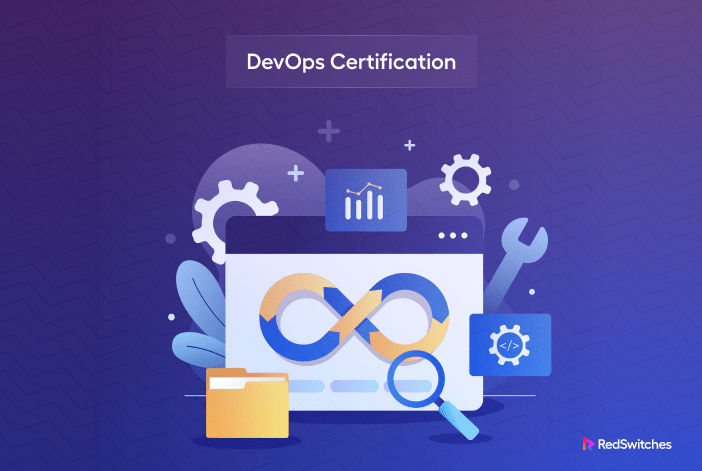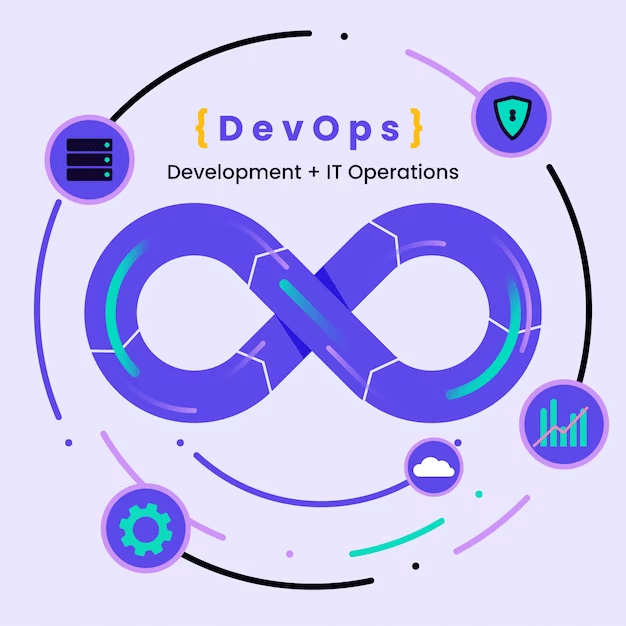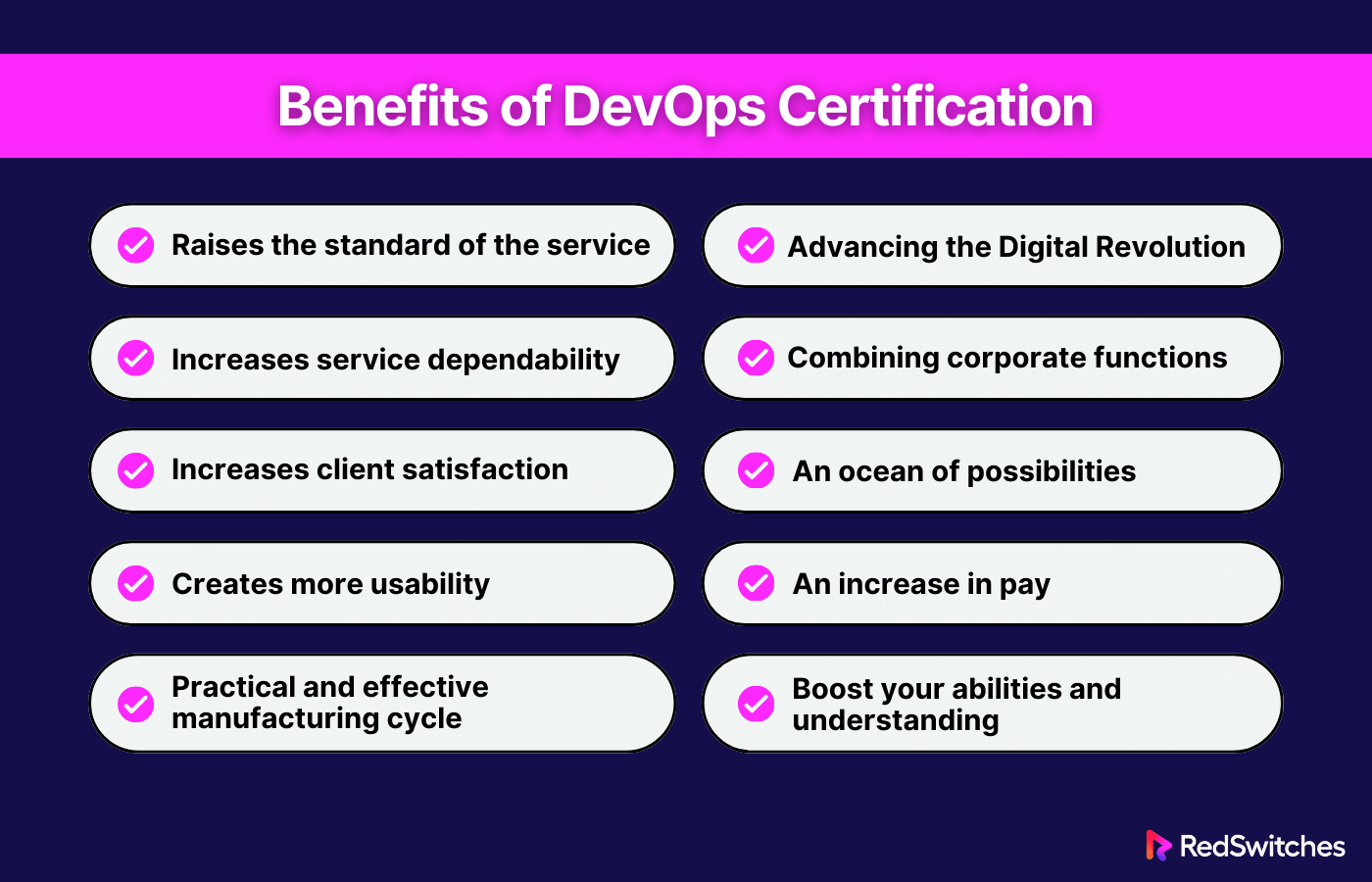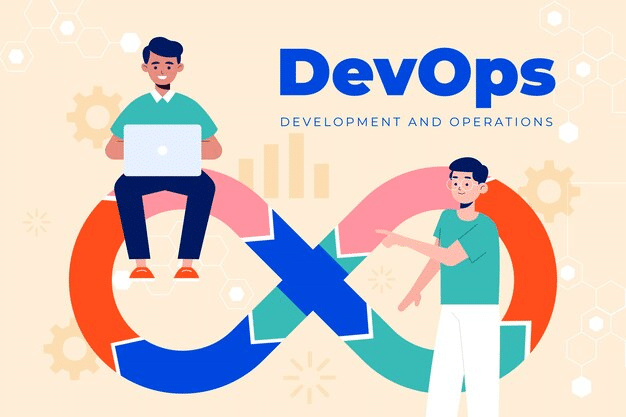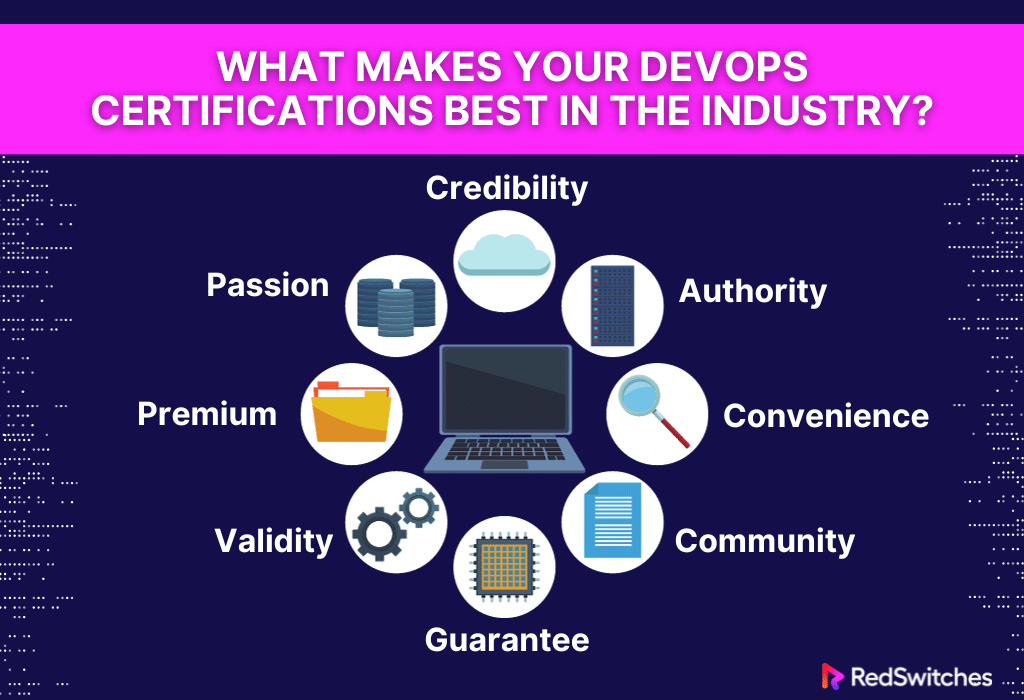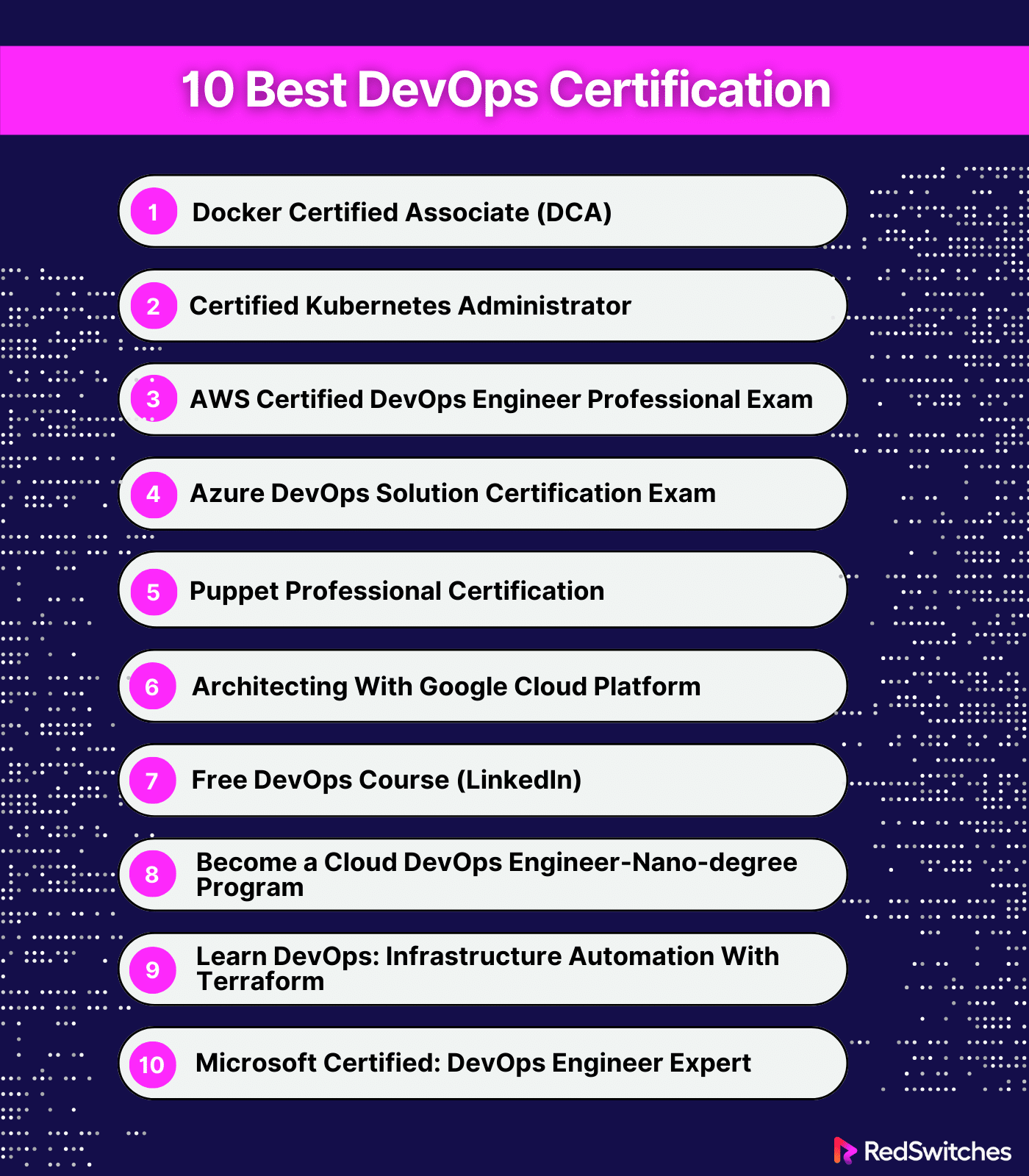Understanding DevOps techniques is crucial for promoting innovation and efficiency inside companies in today’s rapidly evolving tech sector. Professionals with experience in DevOps are in great demand as more and more firms embrace digital transformation.
This in-depth blog will walk you through the top 10 in-demand DevOps certifications reshaping the IT sector in 2024, whether you’re an aspiring IT enthusiast or an experienced professional looking to expand your skill set. In this article, we are going to discuss the best DevOps certification.
Learn about the essential credentials that will help you succeed in the fast-paced field of DevOps and take your career to new heights.
Let’s Begin.
Table Of Contents
- What is DevOps?
- What Makes Your DevOps Certifications Best in the Industry?
- 10 Best DevOps Certification
- Docker Certified Associate (DCA)
- Certified Kubernetes Certification (CKA)
- AWS Certified DevOps Engineer Professional Exam
- Azure DevOps Solution Certification Exam
- Puppet Professional Certification
- Architecting With Google Cloud Platform
- Free DevOps Course (LinkedIn)
- Become a Cloud DevOps Engineer- Nano-degree Program
- Learn DevOps: Infrastructure Automation With Terraform
- Microsoft Certified: DevOps Engineer Expert
- Is DevOps Certification Expensive?
- Conclusion
- FAQs
What is DevOps?
Credits: Freepik
Software development (dev) and operations (ops) are combined to form DevOps, which is described as a software engineering technique that seeks to foster a culture of shared accountability and collaboration and combine the work of operations and development teams.
The best way to describe DevOps is as a collaborative effort to design, develop, and deliver secure software quickly. Software development (dev) and operations (ops) units can speed up delivery through automation, teamwork, quick feedback, and iterative improvement with the help of DevOps practices.
To bring people, processes, and technology together for application design, development, delivery, and operations, DevOps integrates development (Dev) and operations (Ops). Formerly divided responsibilities, including development, IT operations, quality engineering, and security, may now coordinate and work together thanks to DevOps.
Teams use DevOps tools, culture, and practices to build applications with greater confidence, better meet customer expectations, and expedite corporate goals. DevOps produces better, more dependable products, enabling teams to continuously add customer value.
Why Does DevOps Certification Matter?
Credits: Freepik
The DevOps certification is An authorized certificate showing the particular competitive abilities and subject knowledge needed to succeed as a DevOps expert. Acquired via various tests, training programs, or performance evaluations, they demonstrate that the applicant fulfilled strict requirements.
A DevOps certification improves one’s chances of landing an excellent job because DevOps positions frequently rank among the highest-paid incomes. With the qualification, you’re also prepared to collaborate with developers, business analysts, QA, and operation engineers in a cross-functional team.
Please be aware that several new independent certification bodies are vying for recognition in the DevOps certification space. However, vendor-based credentials are the way to go if you are searching for a profitable DevOps certification.
However, this does not imply that getting further certificates won’t help you advance in your job.
Microsoft Azure is the cloud platform for about 70% of all businesses, including 95% of Fortune 500 firms. Azure is a big deal, and you’ll probably need to be an expert in Azure to be considered for your dream DevOps position.
You have every incentive to obtain this DevOps certification if you set your sights on a position that calls for it. Obtaining your DevOps Engineer certification will take some time, but the effort will be worth it.
This DevOps certification can be helpful if you hope to get a promotion that calls for more DevOps experience in Azure environments. Your chances of getting promoted increase with your level of education and experience. Obtaining the promotions you truly desire can be made easier with a Microsoft DevOps Expert Certification.
You won’t produce significant outcomes that garner respect if you don’t increase your knowledge and abilities. Certification will help you become more knowledgeable and gain practical experience, which will help you translate your knowledge into wisdom.
Benefits of DevOps Certification
Let’s understand the advantages of DevOps certification.
Raises the standard of the service
First and foremost, two of the most critical aspects of service quality are providing a service without errors, addressing issues, and restoring services to an error-free state. DevOps allows faster feedback loops and better release velocity, leading to a much faster reduction and elimination of MTTR (Mean Time to Repair) problems.
DevOps practices make possible Continuous Integration(CI) and Continuous Deployment(CD) pipelines. These processes make the automated testing of code modifications and the quick rollout of new features possible.
Mean Time to Repair (MTTR) is a crucial measure in service management. Problem identification and resolution can be accelerated with the help of DevOps. DevOps dramatically lowers MTTR by leveraging automation, monitoring, and cooperation between the development and operations teams.
Increases service dependability
Secondly, meeting deadlines is crucial to ensuring the satisfaction of both internal and external clients. Reliable and prompt results allow the business to keep up with the rapid changes in today’s commercial environment. Thanks to DevOps, essential projects can be broken up into smaller, independent deliverables.
DevOps environments break down projects into smaller, more doable jobs. Every task is created, tested, and implemented on its own. Teams can successfully fulfill deadlines with this method.
The corporate environment is ever-changing. DevOps allows businesses to quickly adjust to shifting market demands and technological advancements.
Increases client satisfaction
After that, it will become increasingly important to adjust to the changes in technology, maintain a competitive edge, and keep updated on the latest developments to survive in the highly competitive business environment over the long term.
It is essential to adapt to the changes. You must also be prepared to act when and when the trends alter.
DevOps fosters a culture of continuous improvement. It is beneficial for businesses to receive regular input from customers and end users. DevOps practices encourage businesses to interact with consumers, obtain input, and quickly adopt improvements.
DevOps promotes a proactive approach to handling problems. Through continuous service monitoring and real-time data collection, teams can predict problems before they become serious.
Creates more usability
Consequently, a short release cycle also results in a shorter feedback cycle. As the adage goes, “a content customer means a content business.” Quick updates from customers allow you to assess their satisfaction and enjoyment.
Additionally, you may test and validate your solution with different customer segments thanks to the feedback and satisfaction you receive.
New features and enhancements may be implemented more quickly thanks to short release cycles. An interface that is more responsive and intuitive is advantageous to users. Quick updates allow for the timely implementation of user feedback, improving usability and the user experience overall.
DevOps encourages development that is Customer-Centric. Development teams can customize features to fit unique client needs by continuously monitoring user behavior and preferences.
Practical and effective manufacturing cycle
The practice of development and operations teams cooperating in isolation and silos has long been the norm. As a result, team communication is delayed, eventually hurting software testing and launch. Teams genuinely work closely together and communicate more effectively when they use DevOps.
The organization gains a collaborative work environment, resulting in faster development cycles and better products.
When working with DevOps-qualified personnel, businesses can sometimes complete potentially lengthy projects that take months to complete in hours or days.
Credits: DevOps
Advancing the Digital Revolution
Digital transformation is the way of the future; without it, no business can grow and prosper over the long haul. With technology solutions at the forefront of digitizing company operations, DevOps enables faster service delivery without sacrificing quality.
This offers the advantage of enabling the business to adapt to new trends and keep up with the times. DevOps increases productivity by breaking up projects into discrete phases completed independently and finally coming together.
Combining corporate functions
DevOps uses lean concepts to optimize time and production costs, and earning a DevOps certification improves your company’s productivity and financial results.
The work atmosphere is more favorable when operations and development teams are more cooperative, interactive, and collaborative. Increased agility leads to time and cost savings, significantly reducing overhead that would otherwise rise due to slow and meandering labor.
An ocean of possibilities
DevOps may be young, but it is creating a remarkable number of job chances for its skilled workers. Since demand will always outpace supply when something is new, there is an excellent need for DevOps-certified experts who can set the standard for DevOps practices.
Being proficient and certified in DevOps increases your chances of securing your ideal job or starting a new career in IT development, IT operations and service management, infrastructure architecture, automation architecture, DevOps engineers, and consulting.
An increase in pay
Based on Builtin, the mean annual salary for a DevOps Engineer in the United States is $145,503. This number may change between studies, but it makes sense that DevOps specialists would earn very high compensation given their high market demand.
DevOps-certified individuals are among the top-paid specialists in the IT department because of their specialized expertise and businesses’ constant need for people who can streamline processes.
Boost your abilities and understanding.
A DevOps certification has many benefits, including the knowledge gained from the training, which has particular commercial advantages. Collaborating with multidisciplinary teams across different fields broadens one’s horizons and consciousness.
Black-hat hacking threats emerged in the latter half of the twenty-first century, and as a result, security has become a vital component of any organization.
What makes Your DevOps Certifications Best in the Industry?
After learning the benefits of DevOps certification, below are the factors that need to be considered for ideal DevOps certification.
Credibility
The certification should be recognized and accepted by the DevOps community. Credibility means being dependable and trustworthy.
Credibility in the context of DevOps certification refers to the industry respect and acceptance the certification has, demonstrating that qualified professionals have actual skills and knowledge.
Industry Recognition: The most reputable and well-recognized DevOps certifications guarantee that certified professionals have actual skills and knowledge.
Professional Competence: Employers have faith in certified persons’ abilities to efficiently manage real-world DevOps difficulties since they have shown their competence.
Authority
The certification should be issued by a well-recognized authority that the community knows and respects. The ability to sway opinion or demand deference. Authority in the context of DevOps certifications refers to the knowledge and proficiency that certified professionals have proven, elevating them to prominent positions in the DevOps industry and winning the respect of colleagues and employers.
Issued by Reputable Authorities: Certifications bearing the seal of approval from reputable organizations are authoritative and denote a superior level of expertise.
Respect and Trust: Because of their demonstrated proficiency in DevOps procedures, certified experts are highly regarded and demand respect from employers and coworkers.
Convenience
Acquiring the certification should be easy. The mode of delivery and schedule should help you learn at your own pace. The quality of being simple to use, readily available, or appropriate for a specific use without posing a challenge or causing trouble.
Convenience in the context of DevOps certifications refers to the process’s adaptability and user-friendliness, which enable candidates to obtain certification without materially disrupting their everyday lives.
Flexible Learning: Candidates can learn topics at their own pace without interfering with their everyday lives, thanks to the flexibility provided by DevOps certifications.
Resources That Are Easy to Access: Candidates can quickly obtain study materials and support because tests, learning materials, and other resources are easily accessible.
Community
The certification should have a community of alumni who work in the industry. A good example is Microsoft Azure-related certifications. A community is a collection of individuals interacting with one another and having similar objectives, interests, or attitudes.
The community in DevOps certifications refers to the group of certified professionals who work together, exchange knowledge, and provide mutual support, fostering a dynamic environment for education and career advancement.
Alumni Network: A robust alumni network encourages cooperation and support among qualified professionals, building a community of people with similar objectives and life experiences.
Information Exchange: Trained professionals share information to improve their abilities through interaction and peer learning.
Guarantee
The certification should guarantee the depth and accuracy of the topics. A formal guarantee or commitment, particularly one that imposes terms.
A guarantee for DevOps certificates means that people who have earned the certification have fulfilled specific requirements and have the requisite abilities. Hence, employers know they can trust certified personnel with the appropriate knowledge.
Quality assurance: Certifications guarantee that a person satisfies particular standards, giving companies peace of mind that certified employees have the requisite abilities.
Reliable Expertise: Businesses can rely on certified individuals to use their talents accurately, guaranteeing the dependability and caliber of DevOps procedures inside their establishments.
Validity
The certification should clearly state the validity period, especially the expiry dates. The state of being legally or formally acceptable; the attribute of being sound in reasoning or reality.
Validity in DevOps certificates relates to how relevant and current the certification is, guaranteeing that certified professionals have up-to-date knowledge and abilities functional in real-world situations.
Relevance and Currency: The validity periods of certifications indicate the applicability and currentness of the knowledge and abilities obtained. This guarantees that authorized experts are knowledgeable about the most recent DevOps procedures.
Real-world Applicability: Organizations deem professionals with valid certifications essential because they can apply their knowledge in real-world industry circumstances.
Premium
Generally, paid certifications offer better content with detailed information, downloadable assets, and support from instructors, brands, and the student community. Regarding DevOps certifications, premium denotes the extraordinary caliber of the certification experience, which includes individualized coaching, access to superior resources, and special opportunities.
Premium certifications are a wise investment for professionals who want top-notch education and recognition.
Rich Content: Candidates obtaining Premium certificates thoroughly understand DevOps principles and processes by providing in-depth, extensive information.
Enriching Learning Atmosphere: Thanks to premium certificates, which offer individualized coaching, superior materials, and peer and instructor assistance, professionals can benefit from a supportive workplace atmosphere.
Passion
A powerful, erratic feeling, a deep yearning or excitement for something. When we talk about DevOps certifications, we’re talking about the sincere excitement and commitment of educators, mentors, and the certification body in developing talent, encouraging excellence in the DevOps community, and establishing a stimulating and encouraging learning environment for professionals.
Educator Commitment: Passion-driven DevOps certifications require committed mentors and educators excited about developing talent. They foster a stimulating learning environment that inspires professionals to achieve success.
Constant Improvement: Enthusiastic certification bodies work tirelessly to improve their programs to remain current and encourage people to strive for excellence, which eventually helps the DevOps community as a whole.
10 Best DevOps Certification
Now, we are going to discuss the ten best certifications for DevOps.
Docker Certified Associate (DCA)
The Docker Certified Associate (DCA) is a DevOps tool to validate the skillset with real-world challenges built by experienced Docker practitioners. It is intended for Docker practitioners with some relevant experience working with Docker. It is one of the best certification for DevOps.
Minimum of six months of experience as a Docker Practitioner
Regarding the Test
- Price: $195
- Time: 90 minutes
- 55 Multiple-choice questions
Certified Kubernetes Certification (CKA)
Credits: Freepik
The competencies, expertise, and understanding that a Kubernetes Administrator ought to have are evaluated by the CKA program. The candidate must complete a performance-based set of command-line problems in three hours to pass the online exam.
In this program, users show off their skills in a practical, command-line setting.
The Certified Kubernetes Administrator (CKA) program aims to guarantee that CKAs possess the competence, expertise, and knowledge necessary to carry out Kubernetes administrator duties.
Regarding the Test
- Price: $300
- Time: Three hours
- Type of Question: Solving Problems
AWS Certified DevOps Engineer Professional Exam
A solid understanding of development and operational processes and methods is required for the exam. He must have also picked up some expertise in automated infrastructure development and operating system administration.
Exam preparation for the AWS DevOps Engineer Professional certification requires reading books and white papers, taking an online course, taking practice exams, and participating in discussion forums. Chinese, Japanese, Korean, and English versions of the exam are available.
Regarding the Test
- Price: $300
- Time spent: 170 minutes
- 40–65 multiple-choice questions
Azure DevOps Solution Certification Exam
Credits: Freepik
Microsoft Azure is a cloud computing platform resembling Google Cloud Platform and AWS. Web servers, email servers, databases, file storage servers, virtual machines, user directories, and many other services are among the many that it provides. Integrating Azure with DevOps results in faster and more dependable deployments by streamlining and expediting the entire DevOps process.
The Azure DevOps Engineer Expert certification, one of several Azure offers, attests to Azure DevOps specialists’ particular knowledge and proficiency.
Regarding the Test
Azure Administrator Associate and Azure Developer Associate are prerequisites;
- Price: $165
- Time spent: 170 minutes
- 40–60 multiple-choice questions
Puppet Professional Certification
Puppet is used by more than 35,000 organizations globally; as a result, there is a high demand for engineers, developers, administrators, managers, and architects with experience using Puppet (206 – System Administration Using Puppet Exam).
The Puppet Certified Professional program tests the ability to use Puppet IT automation software at a macro level.
After passing the exam, the candidate can use Puppet to operate the system infrastructure. Modules like data separation and external data sources are available for the candidate to study.
When familiarising oneself with Puppet documentation and recommended practices, the Puppet Language Style Guide can be your bible.
Regarding the Test
- No prerequisite
- Price: $200
- Time: Ninety minutes
- 60 Multiple-Choice Questions
Credits: Freepik
Architecting With Google Cloud Platform
This certification is targeted at DevOps Engineers and Cloud Solutions Architects, but anyone who wants to learn how to build new solutions and integrate their current infrastructure and processes with GCP can take the course.
This series of online courses offers the chance to investigate and learn about several aspects of the cloud platform, including network, application services, and much more, through an abundance of practical laboratories, exercises, and lectures.
Deploying workable solutions is covered in the course, along with safe network interconnection, encryption keys supplied by the customer, security and access control, invoicing and quotas, and resource monitoring. Those who use Compute Engine are DevOps Engineers or architects of cloud solutions who typically plan to enroll in this course.
Regarding the Course
- No Prerequisite
- Coursera offers the course for purchase.
- Cost: Nothing for a week. [Available Financial Aid]
- Timeframe: Variable
Free DevOps Course (LinkedIn)
This course features contributions from renowned DevOps practitioners James Wickett and Ernest Mueller. An overview of the DevOps movement can be obtained by concentrating on the central principle of culture, automation, measurement, and sharing, or CAMS.
The course covers the range of tools and approaches that an organization can use to shift to DevOps, along with integrating lean and agile project management principles with traditional project management ideas like ITSM, SDLC, and ITIL.
The course closes by considering the three fundamental principles of DevOps infrastructure automation, continuous delivery, and reliability engineering. It also includes some extra resources and a quick look at what’s coming next as businesses move away from cloud computing and towards serverless architecture.
Regarding the Course
- No prerequisite
- You can access the course on LinkedIn.
- Price: $ 19.81
- Time: Three hours
Become a Cloud DevOps Engineer- Nano-degree Program
A background in basic object-oriented programming and familiarity with the Linux command line are prerequisites for starting a career as a Cloud DevOps engineer. This course covers the concept of operationalizing infrastructure at scale while delivering apps and services quickly.
The basics of cloud computing, processing power, security, networking, communications, and management services are covered first. Create CI/CD pipelines and use Kubernetes to operationalize microservices at scale, among other important subjects.
Regarding the Course
- An intermediate level of JavaScript is required.
- The course can be found on Udacity.
- Price: $ 959.28
- Time frame: 4 months
Learn DevOps: Infrastructure Automation With Terraform
Automation is expected to be a key component of future technology. If you want the upper hand, this course is the ideal place to start. It teaches you how to use Terraform to automate your infrastructure. Start with the basics and work your way up to more complicated subjects. Seize the chance to gain real-world experience, which will aid in consolidating your ideas.
Clear instructions are provided on how to configure and use the necessary tools. The lectures are updated frequently per the development of pertinent technologies. Numerous code examples are available for you to utilize to automate your infrastructure.
Regarding the Course
- Lack of a prerequisite
- You may get the course on Udemy.com.
- Price: $ 8.39
- Time: Seven hours
Also Read: Unraveling the Dynamics of Terraform vs Kubernetes
Microsoft Certified: DevOps Engineer Expert
Through ongoing deployment and integration, the program provides a taste of response to the shifting market conditions. It provides instruction on monitoring applications, feedback loops, and client satisfaction. This program, which consists of eight courses, advances you toward becoming an expert in this area.
The Microsoft certification, offered on edX, was developed to assist you in acquiring the knowledge and abilities necessary to succeed in any DevOps environment.
Regarding the Course
- No prerequisite
- The course can be found on edX.
- Price: None
- Time: 16 to 30 hours
Credits: Freepik
Is DevOps Certification Expensive?
Depending on the certifying body, the certification level, and the program’s resources, the price of a DevOps certification might vary significantly. Generally speaking, earning a DevOps certification might be costly. The majority of certification providers charge for the certification exam itself, as well as for online or in-person training sessions and training materials.
Furthermore, several certificates impose attendance requirements on applicants, which raises the total cost. When weighing the costs, it’s crucial to consider the possible advantages of certification, such as more career options and higher earning potential.
Many professionals discover that getting certified in DevOps is an investment that pays off long-term. It can improve their marketability, abilities, and credibility in the quickly developing DevOps area.
Conclusion
In conclusion, people hoping to succeed in the technology sector must comprehend the fundamentals of DevOps and its critical role in contemporary IT operations. A DevOps certification is an excellent tool because it provides a thorough understanding of the processes and opens up a multitude of career and financial growth prospects.
Our investigation of the top 10 DevOps certifications shows that selecting the appropriate certification can have a significant impact. Your DevOps Certifications are the best in the sector regarding industry recognition, thorough instruction, and practical relevance, giving aspiring DevOps practitioners a competitive edge.
RedSwitches understands how critical it is to remain ahead of the ever-changing tech industry. By adopting DevOps principles, businesses can achieve streamlined operations, faster delivery, and increased collaboration.
Our state-of-the-art hosting solutions are designed with DevOps practices, guaranteeing smooth deployment and integration. To take your IT activities to the next level, embrace the power of DevOps, get certified to improve your abilities, and work with us. Let’s go on an innovative and efficient journey together to change how we think about technology in the digital age.
FAQs
Q. What DevOps certification do I need for DevOps?
AWS Certified DevOps Engineer, Docker Certified Associate, Microsoft Certified: Azure DevOps Engineer Expert, and other respectable DevOps credentials are among the many offered.
Q. Is DevOps certification worth it?
DevOps certifications do pay off because they improve your employability, abilities, and credibility in the tech sector, which leads to improved employment chances and career advancement.
Q. Is DevOps certification in high demand?
Yes, there is an excellent need for DevOps specialists as organizations increasingly realize how valuable it is for enhancing teamwork, productivity, and software delivery procedures.
Q. How can DevOps help my company?
By encouraging a culture of cooperation between the development and operations teams, DevOps may help your company release software more quickly and with more excellent dependability.
Q. Is a technical background required to get DevOps certification?
A technical background is not required to get DevOps certification; however, it can be beneficial.
Q. What is the focus of the 2024 Best DevOps Certification Training for Professionals?
The focus of the 2024 Best DevOps Certification Training is to provide comprehensive knowledge and practical skills to professionals seeking to advance their careers in the field of DevOps.
Q. How can I prepare for a DevOps certification in 2023?
To prepare for a DevOps certification in 2023, you can enroll in a reputable DevOps training course that covers essential concepts, best practices, and hands-on experience in implementing DevOps principles and tools.
Q. What are the in-demand DevOps certifications in 2023?
In 2023, popular in-demand DevOps certifications include AWS certification, CKA certification, and various associate certifications that validate proficiency in DevOps skills and practices.
Q. What are the benefits of obtaining a DevOps certification?
Obtaining a DevOps certification can lead to enhanced career prospects, increased credibility as a DevOps professional, better job opportunities, and the ability to implement DevOps practices effectively within organizations.
Q. How can I choose the right DevOps certification for my career?
When choosing a DevOps certification, consider factors such as your current skill level, career goals, industry requirements, and the specific DevOps tools and practices you aim to specialize in. Researching the available certifications and their relevance to your career path is essential.
Q. What does the DevOps certification training course cover?
The DevOps certification training course covers a wide range of topics including DevOps concepts, best practices, tools and technologies, automation, continuous integration and deployment, cloud services, security considerations, and the implementation of DevOps culture within organizations.
Q. How can I advance my career in DevOps through training and certification?
By pursuing comprehensive DevOps training and certification, you can enhance your DevOps skills, gain industry-recognized credentials, and establish yourself as a skilled DevOps professional, thereby advancing your career prospects and opportunities.
Q. Is there an online training option available for DevOps certification?
Yes, there are online training options available for DevOps certification, providing flexibility and convenience for professionals to access quality educational resources and practical training from anywhere with internet access.
Q. What are the top DevOps certifications for developers?
Some of the top DevOps certifications for developers include AWS Certified DevOps Engineer, Certified Kubernetes Administrator (CKA), and certifications offered by DevOps Institute, emphasizing relevant skills and best practices for DevOps roles.
Q. How can I implement DevOps principles and practices within my organization?
To implement DevOps within an organization, it is essential to undergo thorough training, obtain relevant certifications, gain hands-on experience with DevOps tools, and collaborate with teams to integrate DevOps culture, automation, and continuous improvement into the software development and delivery processes.
